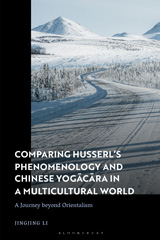Comparing Husserl's Phenomenology and Chinese Yogacara in a Multicultural World
272 p.
While phenomenology and Yogacara Buddhism are both known for their investigations of consciousness, there exists a core tension between them: phenomenology affirms the existence of essence, whereas Yogacara Buddhism argues that everything is empty of essence (svabhava). How is constructive cultural exchange possible when traditions hold such contradictory views? Answering this question and positioning both philosophical traditions in their respective intellectual and linguistic contexts, Jingjing Li argues that what Edmund Husserl means by essence differs from what Chinese Yogacarins mean by svabhava, partly because Husserl problematises the substantialist understanding of essence in European philosophy. Furthermore, she reveals that Chinese Yogacara has developed an account of self-transformation, ethics and social ontology that renders it much more than simply a Buddhist version of Husserlian phenomenology. Detailing the process of finding a middle ground between the two traditions, this book demonstrates h
ow both can survive and thrive together in order to overcome Orientalism. [Publisher's text].
Special access authorizations may apply; please contact us for further information.
-
Informations
ISBN: 9781350256910


